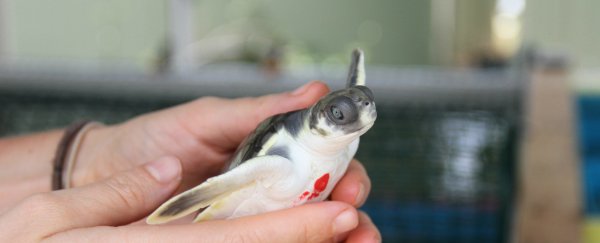Scientists from James Cook University in Australia are about to release 26 impossibly cute little flatback turtles (Natator depressus), fitted with non-invasive GPS trackers, in order to find out more about the life cycle of the enigmatic reptiles.
Using the information that's beamed back from the turtles' GPS trackers, scientists will be able to learn valuable information about the turtle's movements, where they live, and how they navigate ocean currents.
This is the first time the university, which is conveniently located on the doorstep of the Great Barrier Reef, has undertaken such a project. The data collected will help researchers to better protect the species, which, in Australia, has been classified by the Northern Territory, Queensland and Western Australian governments as vulnerable to extinction. But the species isn't listed on the IUCN Red List as yet, because there's insufficient information to assess its status.
The James Cook University turtles will hopefully help to change that. They're almost three months old now - a time in the reptile's lifecycle that scientists know very little about.
"They are described as 'post-hatchlings', and turtles of this age are not seen in the wild very often," said co-leader of the project, Mark Hamann, in a James Cook University press release. "They tend to live in the places of the Great Barrier Reef that people don't often visit or use, such as the lagoon areas between the coast and the coral reefs."

The turtles are currently being looked after in tanks at the university while researchers wait for them to gain enough weight to carry the GPS tags. They're also being fitted with dummy tags to make sure the devices don't hamper their movement.
Hannam announced in the release that the turtles are expected to be released in late April or May, after they've spent a few more weeks being fed a mixture of turtle pellets, baby porridge and bread.
We can't wait to discover the important data these little scientists send back and hopefully use it to protect turtles in the future.
Want to help protect tropical species? Find out more about studying at James Cook University.
